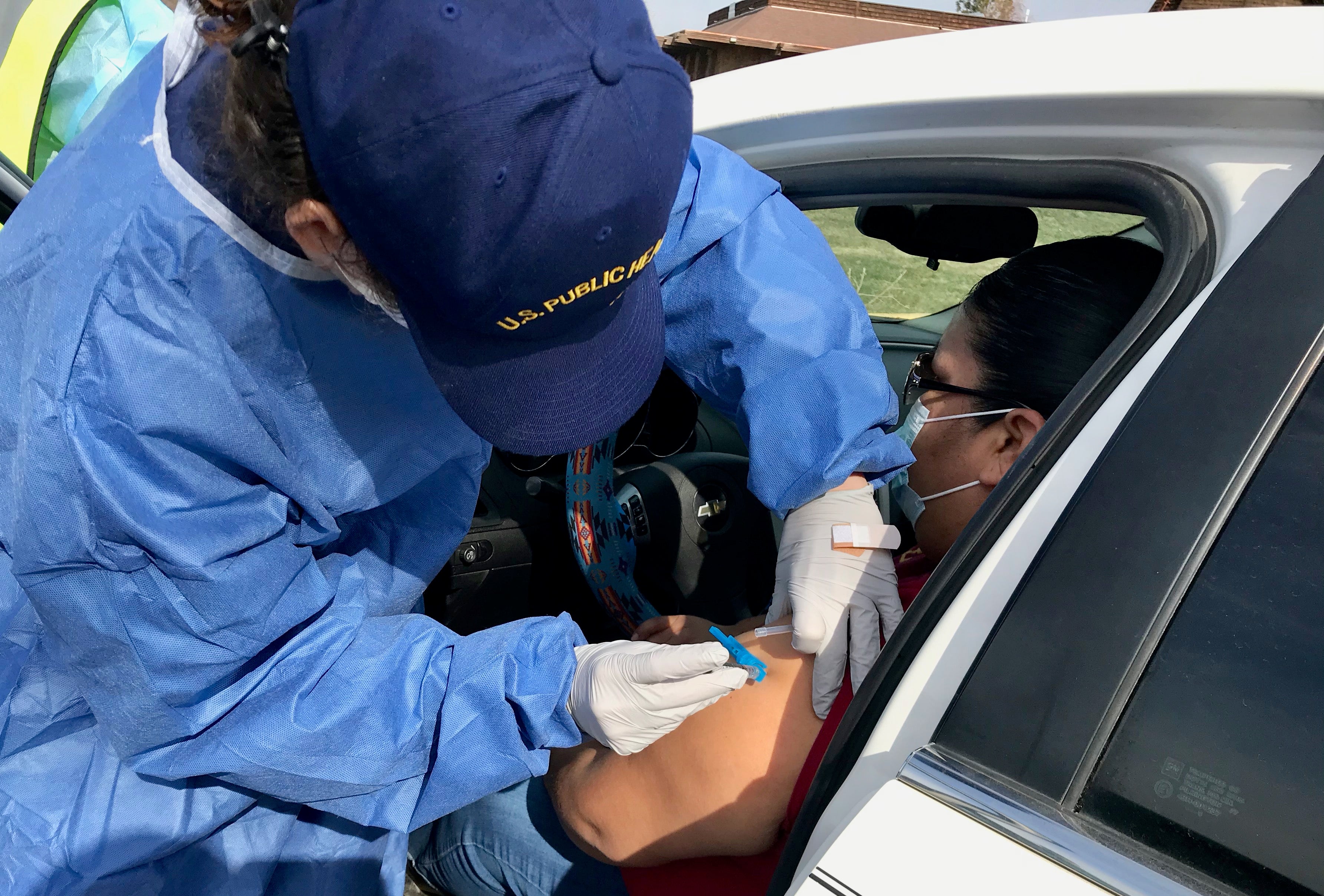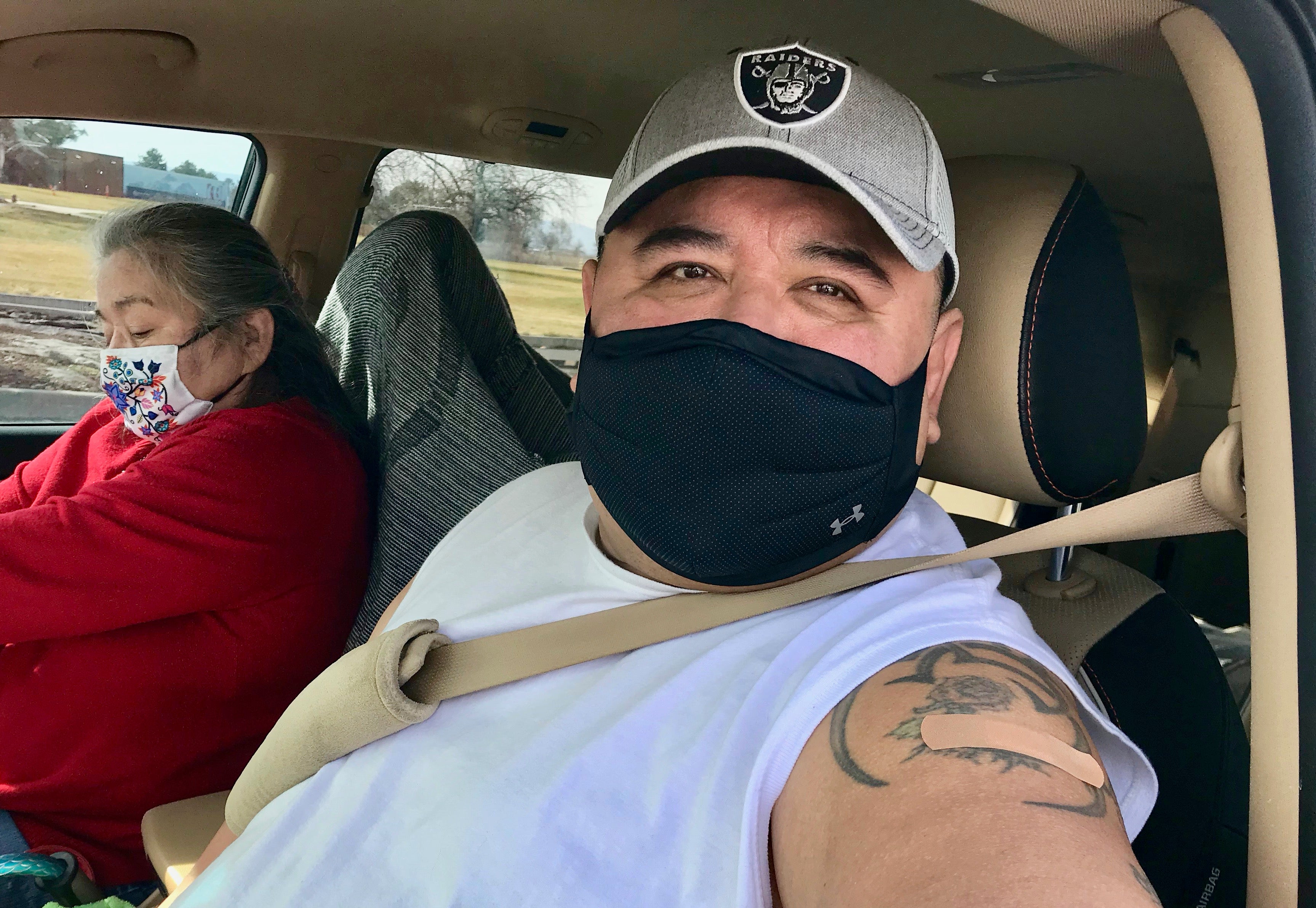‘It’s the end of the nightmare’: Native Americans of Yakama Nation celebrate vaccination roll-out
Indigenous groups appear more willing to put community first, reports Andrew Buncombe in Toppenish


Ken Leadercharge reckoned he knew as many as 10 or 15 people who had died from the virus. And those were close friends and neighbours, not distant acquaintances. One had been buried just days earlier.
So when the opportunity came for him to get the vaccine, he was not going to hang around.
“I've been keeping to myself, staying away. Trying to be healthy. Keep wearing masks,” he says. “But I got it, as soon as was possible.”
Leadercharge, 51, was sitting in in the front of his SUV at a drive-thru vaccination clinic held for members of the Yakama Nation, one of hundreds of indigenous communities in the US that have suffered grievously during the pandemic. Data show that along with African Americans and Latinos, indigenous communities were most at risk of contracting the disease, and least equipped to combat it once it struck.
At one stage last summer, one native community, the Navajo Nation, located in the American southwest, had the highest infection rates in the country.
Read more:
Yet things may be turning: surveys combined with anecdotal evidence suggest people in Native American communities may be more willing than most to take one of the three vaccines now available, putting aside any inoculation anxiety for the betterment of the wider community.
“That is something I have been hearing anecdotally – that they recognise the importance of taking the vaccine,” says Dr Mary Owen, Director of the Centre of American Indian and Minority Health at the University of Minnesota. “That is certainly part of the tradition.”
The Yakama Nation Reservation occupies more than 2,000 square miles in the south of Washington state, about three hours’ drive from Seattle. It was created following an 1855 treaty that requires the federal authorities to provide healthcare services to the tribe.
As such, the clinic held at at cultural centre in the city of Toppenish that was providing shots of the Pfizer vaccine, was overseen by the Indian Health Service (HHS), a federal agency.
Jay Sampson, the senior Yakama HHS official and a member of the community, says staff were now vaccinating anyone over the age of 50, whereas in Washington state it is only those aged 65 and over who are eligible to receive the vaccine, unless by dint of their job or position. Sampson says on the reservation, they had managed to vaccinate around 22 per cent of the population so far, slightly better than elsewhere in the state.
“There has been a great focus into getting vaccines into people’s arms whenever we have it,” he says. “We are also making plans to reach the more remote communities, as well as members of the homeless population.”
In many such communities, there is intense suspicion of the federal government, which is blamed in part for what many consider the genocide of indigenous Americans after the arrival of Christopher Columbus in 1492. A 2019 paper in the Quaternary Science Reviews by researchers from the University of London suggested 56 million indigenous Americans were killed throughout the continent by 1600, victims of war, famine, smallpox and other diseases.
Owen says distrust of the HHS in particular is related to its involvement in forced sterilisation programmes that ran into the 1970s, and often a failure to liaise with community leaders.
In Toppenish, to try and build real trust, the HHS has asked community leaders and tribal elders to vouch for the safety of the vaccines. The tribe has posted such messages on Facebook, and also held education and outreach sessions. Mr Sampson says 98 of the 118 members of HHS staff in Toppenish have been vaccinated – it is not mandatory – and more are opting for a shot each day, as they learn more about its safety.
And yet many people remain nervous.

Lena Thompson, a mother of four, had made the vaccine appointment the day before. She said while the pandemic had forced her to stay at home for 12 months and despite her husband being mildly ill, with the disease, it had not impacted her life greatly.
“I’m just trying to get on with my daily life, and hope the virus passes.”
Bethan Yallup was driving past with her nine-year-old son and 13-year-old daughter and decided on the spot to get vaccinated. She said she worked in hospitality, and wanted to protect herself.
She knew several people who had fallen ill.
“Hopefully this will be the end of it,” she says. “It feels like the end of a nightmare.”
There are around 12,000 members of the tribe who live on the reservation, a combination of farmland, mountains, open grasslands and wild rivers that stretches south towards the border with Oregon, and the Columbia River.
Officials say there have been more than 1,509 Covid infections and at least 49 deaths in the community.
In February, a survey of 1,435 Native Americans in 46 states suggested 75 per cent of respondents would be willing to receive a vaccine, according to the Seattle-based Urban Indian Health Institute. It said those who answered said they felt it was their responsibility. In the US as whole the figure is slightly lower at 70 per cent.
Among the most powerful advocates for Covid safety as the pandemic took hold were a married couple, Nettie Dionne, and her husband Richard, owners of a coffee shop, who both fell ill last spring and appeared in a video urging people to take the disease seriously, and seeking to counter any vaccine stigma.
“When we first got diagnosed, a flood of fear came over us. It affected our entire family. It wasn't about just me and my husband being positive, but we have four children that we have to think about also,” she says.
“We all need to take this seriously, and we need to be taken all the safety precautions possible.”

Another striking voice was that of, Shayla Spencer, a member of the Yakama Nation Tribal School graduating class of 2020, and who spoke of both the struggle, and the need to be thankful for what people had.
“I want everyone my age to understand to take care of their families, and that people are losing their lives to this,” she says in the video.
“And if we take this pandemic seriously we can go back to our normal lives. It's okay to take time away from friends, and to take care of your family to take care of herself.”
Despite that, some appear to have little interest in the vaccine, or anything else being offered by the federal government.
Bill George, 62, is a retired logger. Loading groceries into his truck at a store in the centre of Toppenish, he is not wearing a mask and says he has no plans to get vaccinated. He claims both the virus and the vaccine have been produced by China.
He says he spends most of his time raising his grandchildren, and preventing them falling prey to drug dealers, who he claims are commonplace.
“You just have to talk to them, and show them the right way,” he says. “Anyone can fall off the wagon. It takes courage to stick to things.”
Brianne Hosteen, 29, says she has not had the vaccine yet, though members of her family have, and they have been trying to persuade her to do the same.
“My mum and my older sister keep telling me,” she says. “I wanted to wait and see.”
When asked how the pandemic has struck the community, she says: “It’s been terrible here.”
Join our commenting forum
Join thought-provoking conversations, follow other Independent readers and see their replies
Comments
Bookmark popover
Removed from bookmarks